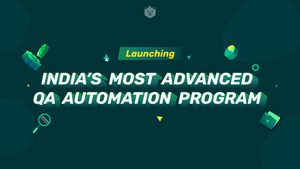Test Automation is the way already and will be way ahead too with more sophisticated tools invented and introduced very frequently. With N number of test automation tools in the market, let us understand the Test Automation Tools in different categories and explore the popular tools under each category.
Web-Based Automation Tools
A web-based test automation tool is a software application specifically designed to automate the testing of web applications. These tools provide functionalities to simulate user interactions, validate expected behaviors, and generate test reports. They typically operate within a web browser environment, allowing testers to automate various actions and verify the functionality, performance, and security of web applications.
Selenium: One of the most popular and widely used open-source tools for web automation testing.
Cypress: A modern, JavaScript-based framework for web automation testing, known for its simplicity and speed.
Playwright: A powerful, cross-browser automation library built on top of the Chromium, WebKit, and Firefox engines.
Watir: A Ruby-based web automation library that provides a simple and expressive way to interact with web applications.
Puppeteer: A Node.js library that provides a high-level API for controlling Chrome or Chromium.
TestCafe: A JavaScript-based framework for end-to-end web automation testing, known for its ease of use and cross-browser support.
WebdriverIO: A powerful JavaScript-based test automation framework that supports various browsers and platforms.
Desktop-Based Automation Tools
A desktop-based test automation tool is a software application specifically designed to automate the testing of desktop applications, which are applications installed and run on desktop computers or laptops. These tools provide functionalities to simulate user interactions, verify application functionality, and generate test reports for desktop-based software systems.
CodedUI: A Microsoft tool for UI testing of desktop and web applications.
SikuliX: A powerful tool for automating GUI testing using image recognition.
AutoIt: A scripting language used for automating tasks in Windows environments, including desktop application testing.
Web + Desktop Based Automation Tools
TestComplete: A comprehensive test automation tool that supports a wide range of technologies, including web, desktop, mobile, and API testing.
UFT (Unified Functional Testing): A commercial tool from Micro Focus that provides a comprehensive solution for functional and regression testing.
Behavior Driven Development (BDD)
Behavior Driven Development (BDD) is an agile software development methodology that focuses on collaboration among stakeholders (business, development, and testing teams) to ensure a common understanding of desired behaviors and outcomes. BDD emphasizes the importance of defining and documenting behavior from a user's perspective to drive development and testing activities.
Cucumber: A popular BDD framework that uses a natural language syntax (Gherkin) to define test scenarios.
SpecFlow: A BDD framework for .NET applications that uses a similar syntax to Cucumber.
Behat: A BDD framework for PHP applications.
Behave: A BDD framework for Python applications.
No or Less Code Automation Tools
No-code or low-code test automation tools provide a visual interface or simplified scripting language to automate tests without the need for extensive coding. These tools allow users with little or no programming experience to create automated tests quickly.
Katalon Studio: A powerful and versatile test automation tool that supports various technologies, including web, mobile, API, and desktop applications.
Functionize: A cloud-based test automation platform that uses AI to create and maintain automated tests.
Tosca: A comprehensive test automation tool from Tricentis that supports a wide range of technologies.
TestCraft: A codeless test automation platform that uses AI to create and maintain automated tests.
Testim: A cloud-based test automation platform that uses AI to create and maintain automated tests.
Testsigma: A cloud-based test automation platform that supports a wide range of technologies.
Sahi Pro: A Java-based test automation tool that provides a simple and intuitive way to create automated tests.
Ranorex: A commercial test automation tool that supports a wide range of technologies, including web, desktop, and mobile applications.
Telerik Test Studio: A commercial test automation tool that provides a comprehensive solution for web, desktop, and mobile applications.
Mobile Automation Tools
Mobile test automation tools are software applications or frameworks specifically designed to automate the testing of mobile applications on various platforms such as iOS and Android. These tools provide features to interact with mobile devices, simulate user actions, and validate expected behaviors. Mobile test automation tools are crucial for ensuring the quality and reliability of mobile applications, as they enable efficient and repeatable testing processes.
Appium: A popular open-source cross-platform mobile automation framework that supports both iOS and Android.
UI Automator: A testing framework provided by Android for testing user interface components.
Calabash (BDD): A BDD framework for testing native and hybrid mobile applications.
Espresso: A testing framework provided by Android for testing user interface components.
API Testing Tools
API testing tools are software applications or frameworks specifically designed to test the functionality, performance, and security of APIs (Application Programming Interfaces). These tools help automate the process of sending requests to APIs (simulating API requests), validating responses, and analyzing the behavior of API endpoints and its performance.
Postman: A popular tool for API testing, development, and documentation.
SoapUI: A powerful open-source tool for API testing, supporting various protocols such as SOAP, REST, and JMS.
RestAssured: A Java library for API testing that provides a fluent API for writing tests.
Karate (BDD): A BDD framework for API testing that uses a simple and expressive syntax.
Performance Testing Tools
Performance testing tools are software applications or frameworks that help measure and evaluate the performance, scalability, and stability of software applications under various load conditions. These tools simulate real-world user scenarios and generate load to test how an application performs in terms of response time, throughput, resource utilization, and other performance metrics. Performance testing tools provide features to monitor system resources, analyze bottlenecks, and generate detailed reports.
JMeter: A popular open-source performance testing tool that can be used to test web applications, APIs, and other systems.
LoadRunner: A commercial performance testing tool that provides a comprehensive solution for load and performance testing.
Test Execution Platform
A test execution platform is a software tool or infrastructure that enables the execution of automated or manual tests on various platforms, devices, and configurations. It provides an environment for running tests and capturing test results. Test execution platforms are essential for validating software applications and ensuring their functionality across different environments.
Lamda Test: A cloud-based platform for cross-browser testing and automated testing execution.
BrowserStack: A cloud-based platform for browser testing and automated testing execution.
Sauce Labs: A cloud-based platform for automated testing execution across various browsers and devices.
CrossBrowserTesting: A cloud-based platform for cross-browser testing and automated testing execution.
TestingBot: A cloud-based platform for browser testing and automated testing execution.
CI/CD Dev Ops Tools
CI/CD (Continuous Integration/Continuous Deployment) is a crucial aspect of DevOps practices that focuses on automating the build, testing, and deployment of software applications. There are several tools available that support CI/CD processes and help streamline the development and release cycles.
Jenkins: A popular open-source CI/CD tool that provides a wide range of features for automating build, test, and deployment processes.
GitLab CI/CD: A CI/CD tool integrated into GitLab, providing a powerful solution for automating software development pipelines.
CircleCI: A cloud-based CI/CD platform that offers a user-friendly interface and powerful features for automating software development workflows.
Azure DevOps: A cloud-based platform from Microsoft that provides a comprehensive set of tools for software development, including CI/CD, source code management, and project management.
Configuration Management Tools
Configuration management tools automate the deployment and management of systems and applications. They streamline the process of provisioning infrastructure, managing configurations, and deploying applications consistently across different environments.
Ansible: A powerful and agentless configuration management tool that uses a simple and declarative language to define infrastructure configurations.
Chef: A configuration management tool that uses a domain-specific language (DSL) to define infrastructure configurations.
Puppet: A configuration management tool that uses a declarative language to define infrastructure configurations.
Terraform: An infrastructure-as-code tool that allows you to define and manage infrastructure resources using a declarative language.
Build Automation Tools
A build automation tool is a software tool that automates the process of building and compiling software applications from source code. These tools help streamline the build process by automating repetitive tasks, managing dependencies, and generating the final executable or deployment artifacts.
Maven: A popular build automation tool for Java projects that provides a comprehensive set of features for managing dependencies, building projects, and running tests.
Gradle: A build automation tool for Java projects that offers a flexible and powerful solution for building and managing projects.
Ant: A build automation tool for Java projects that provides a simple and straightforward way to automate build processes.
Make: A build automation tool that is commonly used in Unix-based systems for building and managing software projects.
MSBuild: A build automation tool provided by Microsoft for building .NET applications.
NAnt: A build automation tool for .NET applications that is based on Ant.
Containers
Containers are lightweight, portable, and self-contained software units that package an application and its dependencies together. They provide a consistent and isolated environment for running applications, regardless of the underlying infrastructure. Containers offer several benefits, such as improved scalability, efficient resource utilization, simplified deployment, and increased development productivity.
Kubernetes: An open-source container orchestration platform that automates the deployment, scaling, and management of containerized applications.
Docker: A popular open-source containerization platform that simplifies the process of building, deploying, and running containerized applications.
What Next?
Setting clear and attainable objectives is the initial step towards advancing your knowledge and pursuing a career in automation testing. If you have decided to follow this path, it is essential to establish a timeline to maintain your motivation and concentration.
Crio's Fellowship Program in QA Automation course offers a structured and practical learning environment for automation testing, including access to mentors who can provide helpful advice and evaluations.
To keep pace with industry advancements, you should continue to enhance your knowledge and improve your abilities by keeping up to date with the latest programming languages, test automation tools, and frameworks. This includes learning popular languages like Java, Python, Javascript, and frameworks like React.
By focusing on these areas, you can gain a strong foundation in test automation and prepare yourself for a successful career in this rapidly growing field. You can also explore concepts like Artificial Intelligence and Data Science to further expand your skillset.
The demand for skilled automation testers is high, and there are plenty of Jobs available in various companies. With the right knowledge and skills, you can secure a rewarding Career as an Automation Tester and make a valuable contribution to the software development process.










